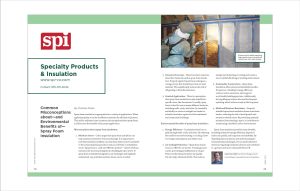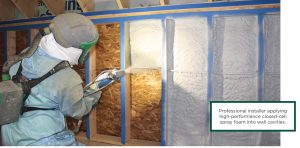Specialty Products & Insulation
Common Misconceptions about—and Environmental Benefits of—Spray Foam Insulation
www.spi-co.com
Contact: 855-519-4044
Spray foam insulation is appropriate for a variety of applications. When applied properly, it can be an effective insulator for all kinds of projects. This article addresses some common misconceptions about spray foam and discusses the benefits of its proper application.
Misconceptions about spray foam insulation:
- Moisture Issues – Critics argue that spray foam insulation can trap moisture and lead to structural damage. It is important to note that moisture problems can stem from other sources unrelated to the actual spray foam product, such as roof leaks or installation errors. Spray foam is a safe and effective product—closed-cell foam increases the structural integrity of a building by up to 300%. If spray foam is installed alongside an air exchanger and regularly maintained, any potential moisture issues can be avoided.
- Chemical Concerns – There have been concerns about the chemicals used in spray foam insulation. Properly applied spray foam undergoes a curing process that transforms it into an inert material. This significantly reduces the risk of off-gassing or harmful emissions.
- Limited Application – There is a perception that spray foam insulation is only suitable for specific areas, like basements. In reality, spray foam is ideal for use in many different locations, including walls, roofs, and attics. Its versatility and ability to create an airtight seal make it a valuable insulation option for both residential and commercial buildings.
Environmental benefits of spray foam insulation:
- Energy Efficiency – It minimizes heat loss or gain through walls, roofs, and attics. By reducing the need for excessive heating or cooling, it lowers energy consumption and utility costs.
- Air Leakage Reduction – Spray foam insulation is an effective air barrier. It seals gaps and cracks, preventing air infiltration or escape. This not only enhances indoor air quality, but also helps eliminate drafts. This reduces energy used in heating or cooling and creates a more comfortable living or working environment.
- Sustainable Construction – Spray foam insulation offers several sustainability benefits. It improves a building’s energy efficiency, reduces carbon emissions, and supports eco-friendly building practices. Additionally, its long lifespan reduces the need for frequent updating, which reduces waste in the long term.
- Mold and Moisture Resistance – Properly installed spray foam insulation forms a moisture barrier, reducing the risk of mold growth and moisture-related issues. By preventing external moisture from entering a space, it contributes to maintaining a healthier indoor environment.
Spray foam insulation provides many benefits, including enhanced energy efficiency, improved indoor air quality, and long-term sustainability. By dispelling misconceptions and understanding its environmental advantages, we can make informed decisions regarding insulation choices and contribute to a greener and more sustainable future.


